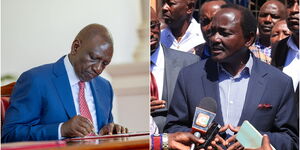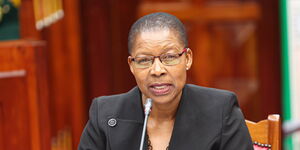The National Assembly Finance Committee has made five major recommendations to the National Tax Policy which will influence the taxation of basic goods and services.
In a report tabled before the floor of the house by the Finance Chair and Molo lawmaker, Kimani Kuria, the major proposals touch on excise duty, Value Added Tax (VAT) and expanding the tax base among others.
Excise Duty
It has been recommended that Excise Duty only be charged on luxury goods and communication services.
The Committee also recommended that the tax should not be imposed on food items, commonly used basic commodities, medicine and agricultural products.
Should the recommendations pass, this move will lower the cost of some of the excisable commodities.
"Provide that, the following shall apply in regard to Excise Duty. Excise duty rates imposed on products shall not exceed the optimal excise duty rate.
"The optimal rate shall be based on studies conducted by the Kenya National Bureau of Statistics (KNBS). The optimal excise duty rates undergo public participation and approval by the National Assembly. The optimal tax rate shall be reviewed every three years," read the recommendations in part.
VAT Rates
The Committee is also proposing to have multiple VAT rates on commodities to cushion the country against external shocks. Notably, one of the most common commodities on which VAT is imposed is fuel.
Currently, the VAT on fuel is set at 16 per cent in accordance with the Finance Act, a move that has pushed pump prices over Ksh200.
"Provide Multiple VAT rates to allow for an opportunity for an alternative rate as a way to cushion the economy against shocks occasioned by global trends and the adverse effects of price increases of these products.
"Provides that in addition to costs compliance and administration costs, as provided for in the draft National Tax Policy, the granting of VAT Exemptions be based on incentivizing investment and cushioning Kenyans from economic shocks," the Committee proposed.
Expanding Tax Base
In a move aimed at raising more revenue for the country, the Committee also proposed that the tax base be expanded with the informal sector which is largely untaxed being targeted.
This move will hamper sectors that have widely remained untaxed which could make those in the informal sector take home less than they are currently earning from their businesses.
The MPs also highlighted that various sectors such as cooperatives did not need to be overburdened with taxes given their contributions to the country's agricultural sector.
"Provide alternative strategies to tax the informal sectors, for instance, possible use of withholding taxes which require businesses to withhold taxes at source when making payments in hard tax sectors," he stated.
Digital Payments
On the other hand, the MPs proposed the adoption of digital payments for goods and services where taxation can easily be monitored.
It was explained that the move could also help expand the tax base.
Levies on Imported Goods
It is proposed that levies on imported goods must be based on and justified by economic assessments.
MPs are also proposing that levies imposed on goods which are aimed at strengthening local manufacturing should take effect for five years.
This will make taxation more predictable and also help measure the effectiveness of government taxation.












